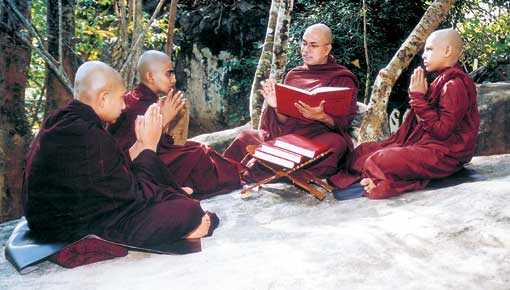| Plus |
|
|||
|
Master
of meditation Keen to don robes, he approached a monk in an aranyaya who wanted to check his horoscope before deciding whether he should be ordained. "How could I have a horoscope? I was born into a Catholic family," says Ven. Kiribathgoda Gnanananda Thera recalling his childhood in one of his many publications. "Through the hospital where I was born, I managed to find the time of my birth with difficulty and got a horoscope prepared. I went back to the monk, who got it read. Whoever read it said that I would go straight to hell after my death and would never see 'Nirvana'. So the monk was rather reluctant to take me in.” He then went to another monk who also got the horoscope read. This time the reading indicated he would go a long way in his search for salvation. "Just imagine how there could be two totally contradictory forecasts," questions Ven. Gnanananda Thera. "I was confused as to how the Buddha's teaching can be given two interpretations based on the same horoscope." He then decided the way ahead was to go to the Himalayas and seek guidance from the rishis on the path to salvation. He was determined not to return to Sri Lanka. Life was tough in the Himalayas. Meals were sparse. Some days he merely had a 'roti' and a little water. He was virtually a skeleton. Then something strange happened. One night, someone dressed in white approached him and asked him why he was feeling so sad. The stranger advised him that he was wasting his time in the Himalayas and that he should go back to his country. He returned and started studying the Dhamma. The Rahula Sutta in the Sanyukhtha Nikaya made him think seriously. "'I' is impermanent. Because it is impermanent, it brings sorrow. Sorrow means that it's not me. It does not belong to me. It's not my soul. Think wisely," the Buddha had preached. "When learning the Dhamma, one must listen carefully. One must remember what is learnt and practise it. The next step is to understand what is being practised," Ven. Gnanananda Thera says. As he began to go deeper into the Dhamma, Ven. Gnanananda Thera thought of sharing his knowledge with those who were keen to learn the Dhamma. "I realised that the benefits of the Dhamma can be seen in this life itself. It's not a dead Dhamma. The Dhamma is eternal. It's not something that is valid for a limited time. The Buddha's teaching is alive even today," he says. After he started preaching, he found more and more young men showing an interest in learning the Dhamma. They were keen to enter the Order. This led him to establish a forest monastery on a 20-acre plot of land in Waduwawa in Polgahawela. The 'Mahamevna Asapuwa', is based on the forest monastery tradition, where monks live in simple dwellings with a few communal buildings. Thirty monks are in residence. Having renounced personal concerns and ambitions they follow the code of conduct established by the Buddha. Facilities are also available for lay people to follow Theravada Buddhist meditation programmes during weekends. With the increasing interest in meditation, Ven. Gnanananda established a second meditation centre at Dompe, Palugama where 15 monks are in residence. Here he conducts a meditation programme for laymen on the first Sunday of each month. A third branch monastery has been opened closer to Colombo, at Pittugala, Malabe. Known as Amawatura Bhavana Asapuwa, this monastery is dependent on donations. A building programme for the construction of a Sanghavasa for resident monks and other amenities including a meditation centre for laymen is underway. In addition to these centres, Ven. Gnanananda Thera has undertaken an exhaustive programme of weekend meditation sessions at many temples. Even though he lives on a single kidney having donated the other to a Catholic mother, he tirelessly conducts these sessions. Thousands of lay devotees follow these programmes, which they find most useful in their daily lives. He teaches an easy-to-follow practical approach to meditation. A prolific writer, Ven. Gnanananda Thera’s sermons are also available on audio cassettes and CDs."I gain satisfaction from my life for two reasons. One is being born a Sinhalese. My ability to learn the Buddha's teaching is the other. I would never have got this opportunity if not for the fact that I was born into the Sinhala race," he says. Ven. Gnanananda is confident that the nation can be revived and built on Buddhist traditions. He underlines the need for lay people to follow the 'Tisarana'. "The Buddha should always be in one's mind. We should be mindful of the teachings of the Buddha and we should respect the Maha Sangha," he insists. "If adults follow these basic principles, we can easily mould the younger generation." (Based
on 'Kiyannam senehasin
A serene Vesak at Mahamevuna The programme which will start at 7 a.m.will emphasise the importance of meditation. After explaining the key elements of the Buddha's teaching, Ven. Gnanananda will guide the devotees in following 'anapanasati' and 'maitri' forms of meditation. During the afternoon session they will follow a guided programme on insight meditation. The day will end with the chanting of the Dhammacakka Pavattana Sutta, the first sermon preached by the Buddha after His Enlightenment at Varanasi. Ven. Gnanananda Thera is confident that today's session will be a new and serene experience for the people. |
||||
Copyright © 2001 Wijeya Newspapers
Ltd. All rights reserved. |
